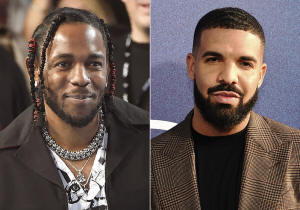Slander or 'trash-talking'? Drake-Kendrick Lamar feud has a day in court
[July 01, 2025]
By JENNIFER PELTZ
NEW YORK (AP) — A federal judge is pondering the nature of rap battles
and the cutting wordplay in Kendrick Lamar ’s “Not Like Us,” the megahit
diss track that spurred a defamation lawsuit from his fellow superstar
Drake.
Drake sued Universal Music Group — both his and Lamar's record label —
over “Not Like Us,” saying the company published and promoted a song he
deems slanderous. Universal says the lyrics are just hyperbole in the
tradition of rap beefing, and the label is trying to get the case
dismissed.
Judge Jeannette Vargas didn't immediately decide after a lively hearing
Monday, when the raw creativity of hip-hop brushed up against the staid
confines of federal court.
“Who is the ordinary listener? Is it someone who’s going to catch all
those references?” Vargas wondered aloud, addressing a legal standard
that concerns how an average, reasonable person would understand a
statement. “There's so much specialized and nuanced to these lyrics.”
Neither artist attended the hearing.
The case stems from an epic feud between two of hip-hop's biggest stars
over one of 2024 biggest songs — the one that won the record of the year
and song of the year Grammys, got the most Apple Music streams worldwide
and helped make this winter's Super Bowl halftime show the most watched
ever.
Released as the two artists were trading a flurry of insult tracks,
Lamar's song calls out the Canadian-born Drake by name and impugns his
authenticity, branding him “a colonizer” of rap culture who's “not like
us” in Lamar's home turf of Compton, California, and, more broadly, West
Coast rap.

“Not Like Us” also makes insinuations about Drake's sex life, including
"I hear you like ’em young" — implications that he rejects.
Drake's suit says that the song amounts to “falsely accusing him of
being a sex offender, engaging in pedophilic acts" and more. Contending
that the track endangered him by fanning notions of vigilante justice,
the suit blames “Not Like Us” not only for harming Drake's image but for
attempted break-ins and the shooting of a security guard at his Toronto
home. The mansion was depicted in an aerial photo in the song's cover
art.
[to top of second column]
|

In this combination of images, rapper Kendrick Lamar appears at the
MTV Video Music Awards on Aug. 27, 2017, in Inglewood, Calif., left,
and Canadian rapper Drake appears at the premiere of the series
"Euphoria," in Los Angeles on June 4, 2019. (AP Photos/Chris
Pizzello, File)
 “This song achieved a cultural
ubiquity unlike any other rap song in history,” Drake lawyer Michael
Gottlieb said. He argued that Universal had campaigned and contrived
to make it "a de facto national anthem” that didn't just address
hip-hop fans who knew the backstory and were accustomed to
over-the-top lyrical battling.
The average listener could be “a 13-year-old who’s dancing to the
song at a bar mitzvah,” Gottlieb suggested.
“That would be a very interesting bar mitzvah,” the judge opined.
(The song has indeed been played at some such celebrations.)
Universal, meanwhile, has emphasized that “Not Like Us” was part of
an exchange of barbs between Drake and Lamar.
“Context is key,” label lawyer Rollin Ransom argued Monday, at one
point apologizing for having to use profanity while reciting some of
the lyrics Drake aimed at Lamar in a track called “Taylor Made
Freestyle.”
“What you hear in these rap battles is trash-talking in the extreme,
and it is not, and should not be treated as, statements of fact,"
the attorney said.
The lawsuit seeks unspecified damages.
Drake also went after iHeartMedia, claiming in a Texas legal
petition that the radio giant got illegal payments from Universal to
boost airplay for “Not Like Us.” IHeartMedia has denied any
wrongdoing. That dispute was resolved in March.
Drake hasn’t sued Lamar himself.
All contents © copyright 2025 Associated Press. All rights reserved |